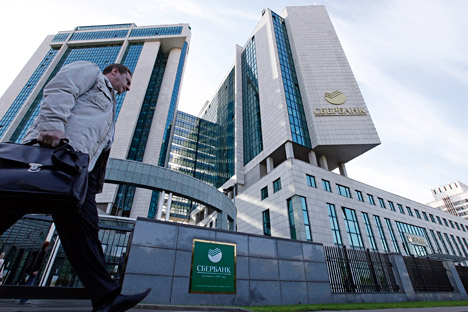Press Digest: U.S. blocks 6 more Russian banks from Visa and MasterCard

U.S. disconnects 6 Russian banks from Visa and MasterCard.
Shutterstock / Legion-MediaU.S.disconnects 6 Russian banks from Visa and MasterCard
The United States Department of the Treasury has announced the expansion of sanctions against Russian companies, reports the Vedomosti business daily. The new list includes Genbank, Krayinvestbank, Upper Volga Bank, Sevastopol Marine Bank, Inresbank, and Mosoblbank.
The first four banks were included on the list because they operate in Crimea, while the other two have been targeted because they are affiliated with SMP Bank, which has already been on the sanctions list for one and a half years.
Starting on Dec. 23, it became impossible to complete some transactions, due to the fact that access to the international payment systems was disabled for these banks, reports Vedomosti.
A MasterCard representative pointed out that because of the new U.S. sanctions, transactions using the bankcards of Genbank and Upper Volga Bank can only be processed according to the rules of Russia’s new National Payment Card System.
The listed banks received notices from Visa about the termination of their access rights on the day the new sanctions were announced, a source close to one of the payment systems told Vedomosti.
Subsequently, the official website of Genbank posted a clarification – in Russia, all the cards issued by the bank are working properly, although customers may face difficulties when traveling abroad. A Mosoblbank call center employee also confirmed to Vedomosti that their cards were working properly in Russia, since their operations use the National Payment Card System.
Russia facing second Islamist front in Central Asia
On Dec. 23, the Defense Minister Sergei Shoigu announced that the situation in Afghanistan has not improved, and Russia and Tajikistan are now facing potential threats from the Islamic State (ISIS)jihadist group in that region, writes news website Gazeta.ru.
In recent years, Islamic militants have made significant gains in their fight against government forces in Afghanistan, and now pose a potential threat to Central Asia, says the publication.
Tajikistan, bordering Afghanistan, could be attacked should fighters from the Taliban militant movement, as well as Islamic State terrorists, come to power. In recent months, they have been increasingly forcing their way into the major cities of Afghanistan, boldly confronting the government army. Most recently, Taliban militants tried to seize the city of Kandahar, by first attacking the city’s airport, which is being used by U.S. and NATO troops. Thirty-seven people were killed during the attack on the airport, including local residents and security officials.
At the same time, as Alexander Khramchikhin, deputy head of the Institute of Political and Military Analysis, noted: “The armed forces of Kyrgyzstan and Tajikistan have extremely low levels of preparedness, and most of their equipment is in a deplorable state. Without foreign assistance, both these countries are incapable of opposing any serious foreign aggression.”
According to some experts, the Americans are holding talks on the possibility of establishing a military base in Turkmenistan. U.S. officials have not confirmed this information.
Both the United States and Russia face common threats from Islamists, who are determined to create a caliphate in the region, but these two world powers have different geopolitical objectives in Central Asia.
“The U.S. wants to return to Central Asia in order to have access to Tajikistan and Turkmenistan. This is needed to be able to fight against Islamic State, but Moscow fears the appearance of new ‘color revolutions’ in the region,” said Theodore Karasik, a leading expert at Gulf State Analytics.
Ex-Yandex employee gets 2-year jail term for stealing source code
Dmitry Korobov, a former employee of Yandex, has been sentenced in Moscow for stealing the company’s source code and the algorithms of its basic service Yandex.Search, reports business daily Kommersant.
Korobov tried to sell the stolen intellectual property, worth several billions of rubles, for $25,000 and 250,000 rubles, and then was planning to spend this money on creating his own startup, but he was arrested by Russia’s security service, the FSB, as the transaction was taking place. The loss of the source code, which Yandex assesses as “a key part of the company,” could have entangled the search engine company in long years of litigation, serious reputational costs, and a drop in market capitalization.
“He was not even aware of the real value of the intellectual property he had stolen. The little money that Korobov planned to earn from the transaction, he was going to spend on creating his own startup,” a source familiar with the investigation told Kommersant.
Korobov was trying to sell the stolen intellectual property on specialized hacker forums, where his activities attracted the attention of the FSB.
The court handed Korobov a two-year suspended sentence.
All rights reserved by Rossiyskaya Gazeta.
Subscribe
to our newsletter!
Get the week's best stories straight to your inbox

